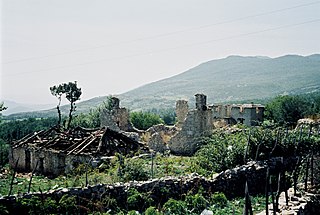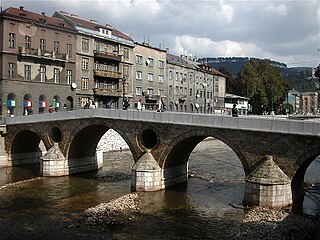 W
WIn September 1998 militants of the KLA's "cobra" unit conducted two ambushes out of Albanian territory near the border outpost of Koshare on Yugoslav forces. Six Yugoslav Army personnel were killed. The KLA suffered no casualties, and captured Yugoslav ammunition, equipment and robbed the dead soldiers.
 W
WOn the morning of April 23, 1998, a band of Kosovo Liberation Army (KLA) fighters was ambushed by a much smaller group of Yugoslav Army (VJ) border guards near the Košare outpost, just west of Dečani. The fighters had been trying to smuggle weapons and supplies into Kosovo via northern Albania. Nineteen were killed in the ensuing attack, and a further two were captured. The VJ did not sustain any casualties. Some of the militants retreated back to Albania, while others managed to break through the ambush and make it past the Yugoslav border, into Kosovo. Following the clash, the VJ confiscated a large quantity of arms that the militants had been transporting.
 W
WOn the 3rd December 1998 a Yugoslav border patrol was attacked by a group of nine Kosovo Liberation Army (KLA) attempting to illegally cross the border between Albania and Yugoslavia. Eight militants were killed in the ensuing exchange, while the border patrol suffered no casualties. This was the most serious armed incident in Kosovo since a truce between the KLA and the Yugoslav security forces had taken effect that October.
 W
WOn December 14, 1998, the Yugoslav Army (VJ) ambushed a group of 140 Kosovo Liberation Army (KLA) militants attempting to smuggle weapons and supplies from their base in Albania into the Federal Republic of Yugoslavia. A five-hour battle ensued, ending with the deaths of 36 militants and the capture of a further nine. Dozens more fled back to Albania, abandoning large quantities of weapons and supplies, which were subsequently seized by the Yugoslav authorities. The ambush was the most serious war-related incident in Kosovo since a U.S.-negotiated truce took effect two months before. It came on the heels of increasing tensions in the province, where inter-ethnic violence had been escalating steadily since early 1996.
 W
WOn July 18, 1998 a Yugoslav Army (VJ) border patrol ambushed a column of Kosovo Liberation Army (KLA) insurgents and foreign mujahideen just west of Dečani, on the frontier between Albania and Yugoslavia. The ambush resulted in the deaths of four KLA fighters and 18 mujahideen, most of whom were citizens of Saudi Arabia. Twelve militants were wounded, and a further six were arrested by the Yugoslav authorities and charged with illegal entry and gunrunning. The VJ reported seizing a significant amount of arms and ammunition that the militants had been smuggling. One Yugoslav border guard was seriously wounded in the clash.
 W
WUnited Nations Security Council resolution 1147, adopted unanimously on 13 January 1998, after recalling previous resolutions on Croatia including resolutions 779 (1992), 981 (1995), 1025 (1995), 1038 (1996), 1066 (1996), 1093 (1997) and 1119 (1997), the Council authorised the United Nations Mission of Observers in Prevlaka (UNMOP) to continue monitoring the demilitarisation in the Prevlaka peninsula area of Croatia until 15 July 1998.
 W
WUnited Nations Security Council resolution 1160, adopted on 31 March 1998, after noting the situation in Kosovo, the Council, acting under Chapter VII of the United Nations Charter, imposed an arms embargo and economic sanctions on the Federal Republic of Yugoslavia, hoping to end the use of excessive force by the government.
 W
WUnited Nations Security Council resolution 1166, adopted unanimously on 13 May 1998, after recalling Resolution 827 (1993), the Council established a third trial chamber at the International Criminal Tribunal for the former Yugoslavia (ICTY).
 W
WUnited Nations Security Council resolution 1168, adopted unanimously on 21 May 1998, after recalling resolutions 1031 (1995), 1035 (1995), 1088 (1996), 1103 (1997), 1107 (1997) and 1144 (1997), the Council strengthened the International Police Task Force (IPTF) in Bosnia and Herzegovina by up to 30 posts to a total strength of 2,057.
 W
WUnited Nations Security Council resolution 1174, adopted unanimously on 15 June 1998, after recalling resolutions 1031 (1995), 1035 (1995), 1088 (1996), 1103 (1997), 1107 (1997), 1144 (1997) and 1168 (1998), the Council extended the mandate of the United Nations Mission in Bosnia and Herzegovina (UNMIBH) for a period terminating on 21 June 1999 and authorised states participating in the NATO led Stabilisation Force (SFOR) to continue to do so for a further twelve months.
 W
WUnited Nations Security Council resolution 1183, adopted unanimously on 15 July 1998, after recalling previous resolutions on Croatia including resolutions 779 (1992), 981 (1995) and 1147 (1998), the Council authorised the United Nations Mission of Observers in Prevlaka (UNMOP) to continue monitoring the demilitarisation in the Prevlaka peninsula area of Croatia until 15 January 1999.
 W
WUnited Nations Security Council resolution 1184, adopted unanimously on 16 July 1998, after recalling previous resolutions concerning the conflicts in the former Yugoslavia, particularly resolutions 1168 (1998) and 1174 (1998), the Council established a programme to monitor the court system in Bosnia and Herzegovina.
 W
WUnited Nations Security Council resolution 1186, adopted unanimously on 21 July 1998, after recalling resolutions 1105 (1997) and 1110 (1997), the Council extended and strengthened the mandate of the United Nations Preventive Deployment Force (UNPREDEP) in Macedonia until 28 February 1999.
 W
WUnited Nations Security Council resolution 1191, adopted unanimously on 27 August 1998, after recalling resolutions 808 (1993), 827 (1993) and 1166 (1998), the Council forwarded a list of nine nominations for judges at the International Criminal Tribunal for the former Yugoslavia (ICTY) to the General Assembly for consideration.
 W
WUnited Nations Security Council resolution 1199, adopted on 23 September 1998, after recalling Resolution 1160 (1998), the Council demanded that the Albanian and Yugoslav parties in Kosovo end hostilities and observe a ceasefire.
 W
WUnited Nations Security Council resolution 1203, adopted on 24 October 1998, after recalling resolutions 1160 (1998) and 1199 (1998) on Kosovo, the Council demanded that the Federal Republic of Yugoslavia comply with previous Security Council resolutions and co-operate with the NATO and Organization for Security and Co-operation in Europe (OSCE) verification missions in Kosovo.
 W
WUnited Nations Security Council resolution 1207, adopted on 17 November 1998, after recalling all resolutions concerning the conflicts in the former Yugoslavia, in particular Resolution 827 (1993), the Council condemned the Federal Republic of Yugoslavia for its failure to execute arrest warrants issued by the International Criminal Tribunal for the former Yugoslavia (ICTY).